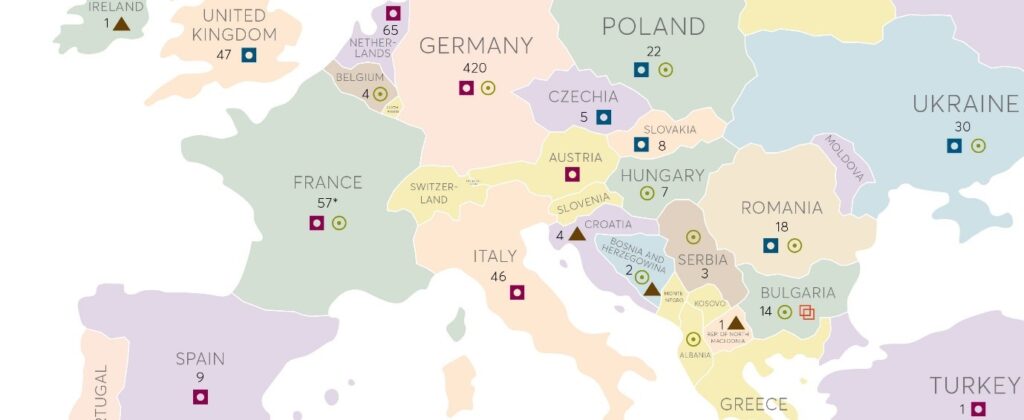Community foundations in Europe: Movement building momentum

Community foundations took root in Europe in the 1980s. Since then, they have spread to 22 countries and evolved in their form and function, adapting to changing social, economic and political circumstances. The fundamental concept of a community foundation involves the organisation of people in a philanthropic institution that harnesses time, talent and money to address needs and bring about change in their locality. Today there are more than 850 community foundations operating across Europe, supported and connected through national networks and associations, and ECFI (European Community Foundation Initiative). Clearly a dynamic international movement of people and organisations that puts geographic communities, philanthropic giving and localism at its core has developed and continues to grow.
Community foundations are hugely diverse, ranging from those operating at neighbourhood level driven by volunteers to those working on a larger scale with a team of professional staff. Some have a significant financial or other asset base, while others work by raising and managing flow-through funds. These organisations have many common characteristics: Community foundations:
- Are independent and are governed by a board of citizens broadly reflective of the communities they serve
- Seek to build, over time, assets and funds from a wide range of donors, including local citizens, other foundations, businesses, and public bodies
- Accumulate and deploy capital (in various forms ‒ human, financial, physical, intellectual, social, and cultural) to make grants or implement activities that address a wide variety of needs in the locality
- Engage in a range of community leadership and partnership activities, serving as catalysts, convenors, collaborators and facilitators to solve problems and develop solutions to local community issues
Importantly, they form part of the philanthropic institutional fabric of the area, adding value to donor funds through a profound knowledge of the locality, and through leverage they have in their connections with others.
Community foundations provide a critical link between local and global issues. This was evident throughout the pandemic when community foundations, as trusted local institutions and partners, were well placed to be first philanthropic responders. Similarly with regard to the SDGs and the climate crisis, community foundations act where global meets local and understand the critical intersections specific to their locality ‒ for example between climate and health or between inequality and sustainable production and consumption.
It is exactly because community foundations are based on trusted relationships among citizens, community groups, donors, municipalities, and businesses that they don’t come about overnight and need time to develop. ECFI works to strengthen and promote the movement in Europe. Essential to this is the role played by others in the philanthropy support ecosystem, notably the 32 foundation associations and networks, operating at national level, which can help in their establishment and ongoing development. This has been supported by international knowledge exchange and more general awareness-raising around their work and potential.

As well as acting as a knowledge centre for the movement and facilitating learning exchanges, building capability and empowering those involved, ECFI gathers and collates information about the field. Our recently published “Community Foundations in Europe: State of the Field 2022” report presents the results of extensive field research based on consultation with national support organisations across Europe. It shows how community foundations from Spain to Ukraine, from Latvia to Sicily, have evolved in their respective national contexts. It serves to demonstrate the richness of the diversity of the field in Europe and provides valuable intelligence for those who want to understand, support, or work with community foundations. The report offers an overview of the community foundation field in Europe along with detailed profiles which provide information on the historical development and current state of the field in each country.
The report notes developments occurring where the field is more extensive and mature, e.g. the UK and Germany, through increased capacity and professionalism and in their leadership role. There are active development initiatives in Belgium, Bosnia and Herzegovina, and Spain that have led to the establishment of new community foundations; and in Albania, Austria, and Georgia, work is ongoing to bring the concept to reality. National support organisations elsewhere, for example in France, Germany, Italy, Poland and the UK have indicated potential for continued growth.
With regard to their work, the report highlights that the role of community foundations in crisis response ‒ e.g. throughout the Covid-19 pandemic and the invasion of Ukraine ‒while being challenging and exhausting, has been particularly valued. There is evidence of greater national and international collaboration, consolidating their leadership, convening and connecting roles. And while they can’t escape from operating in the present, there is an appetite for looking towards a “third horizon”, systems change and new ways of working.
What is evident is that context is everything and that each community foundation is shaped by the historical and current circumstances and operating environment in its locality. Tobias Jung, Director of the Centre for the Study of Philanthropy & Public Goo at the University of St. Andrews, refers in the report to a community philanthropy “kaleidoscope”. This enables an alignment of lenses (relating to castings and concepts; communities and customs; constituencies and connections; capitals and contributions; claims and criticisms), bringing a unique vision which can help determine if a community foundation might be appropriate or viable and contribute to defining its form and function.
We, in ECFI, are excited about the potential of the community foundation movement in Europe, recognising that our connections can transcend differences and reinforce values based on trust, solidarity, citizenship and engagement. We look forward to continuing to build relationships throughout the philanthropy support ecosystem to ensure that the added value that community foundations can bring is recognised and utilised by all with interest in effective European philanthropy.
Authors

